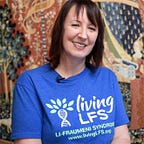My dad’s cousin contacted me recently to ask about our genealogy, since I’d done some research into our family tree back in the early 2000’s. I re-found some of my findings and forwarded them along. In the process, I rediscovered some email conversations about our ancestry that I’d had with my Papa (dad’s dad) 6 years before he died.
My grandmother Shirley died of breast cancer. Shirley’s mother Helen also died of breast cancer. Helen had a sister, and according to Papa, “A knitting needle fell from a third floor porch and hit her in the leg. It caused (?) cancer and she died as a young girl.”
I love being able to see my grandfather’s personality in his writing: “It caused (?) cancer” Yeah, I’d question that too, Papa. I’ve had this email in my files for 16 years, but when I read this, post-LFS, a brand new clue to our genetics smacked me right in the face: Helen’s sister, my great aunt, probably died of a soft tissue sarcoma. I estimate she died in the early 1900s.
Ah, family lore. I shared the knitting needle story with a new mutant recently, and she called “sarcoma” before I even had a chance. She said, “isn’t it funny how many stories there are of injuries that “turn into cancer?” One of the great benefits of the LFS community, or any similar community: other people who really understand what you’re talking about. According to Cancer.gov,
“Injury and lifestyle factors such as smoking, diet, and exercise are NOT linked to the risk for soft tissue sarcoma. But the injury issue has caused some confusion in the past. One reason is that an injured area might swell. That swelling could look like a tumor, but it isn’t one. Also, when you are injured, the pain may draw your attention to the injured area. A doctor may check the area, and x-rays or other imaging studies may be done. This can make it more likely that any sarcoma that’s there will be discovered, even though it may have been there for some time.”
July is Sarcoma Awareness Month. My father has had leiomyosarcoma, and now I know my great aunt likely had soft tissue sarcoma. Mutant screening protocol is to have annual full body MRIs to look for sarcomas. For me so far, so good. But as LFS families tend to get the same bunch of cancers, this confirms I need to be particularly vigilant about sarcomas.
Knowing your family history of cancer is an important part of living with LFS. Learn your “cancestry”!
